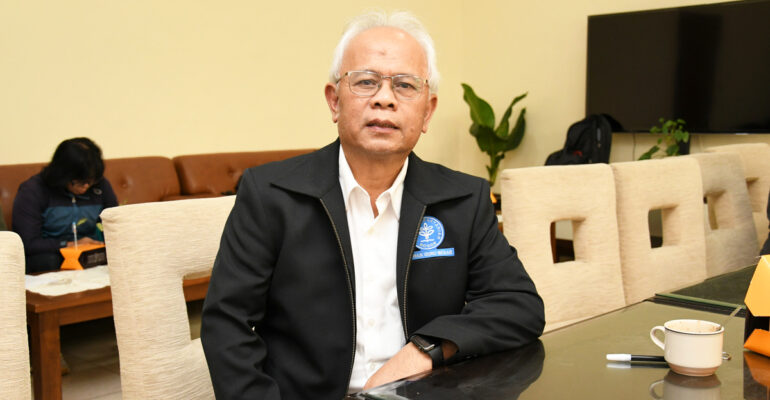Professor of IPB University, Increasing Palm Oil Production with Precipalm

Based on existing data, currently, Indonesia’s oil palm plantation area reaches 13.4 million hectares. There has been a tremendous increase followed by environmental issues. So far there have been allegations of deforestation due to oil palm. But based on the results of a 2017 study, there were 10 hectares of oil palm land, most of which came from reforestation.
This was conveyed by Prof. Dr. Sudrajat during the Open Session of the Inaugural Scientific Oration of the Permanent Professor of the Faculty of Agriculture, IPB University at Dramaga Campus, Bogor (20/7). In his speech, Prof. Sudrajat said that Indonesia’s oil palm productivity had only reached half of its existing potential. To increase its productivity, IPB University conducts basic research in Jonggol, Bogor.
“Finally, we get cultivation recommendations that match the conditions of the local land. We conduct a series of experiments on how oil palm is managed well to get the optimum fertilizer dosage. This is location-specific. Now, this is what we are building as the basic capital for oil palm development going forward, “he said.
To get the optimum dose when fertilizing takes a long time, not to mention waiting for the results of the laboratory that takes three months. So that the recommended fertilizing dose is no longer appropriate for the condition of the plant at that time.
“For that, we form the Precipalm Team where I am the principal researcher in the field of agronomy. Precipalm is a precision farming system that uses sentinel 2 from the European Union. The reason for using sentinel is because this sentinel data is accurate. The precision is up to 10 meters high. The temporal resolution is seven days. The seven-day data is clean and free. Research at Jonggol Gardens is still fundamental research. Then we build a model. Yesterday we developed and took samples in Jambi and Riau. Finally, we know the status of plant nutrients. We also know the needs of plants to per tree, “he explained.
Precipalm can detect various levels of nutrient requirements (N, P, and K) in plants. Precipalm will provide recommendations on nutrient requirements per tree, per box up to per hectare. Every farmer who owns land only needs to send his garden coordinates to the Precipalm Team.
“We download the data, we send the status. This system also allows remote areas. We have already tried this system in Lampung, Riau, and Medan, “he added.
In addition, according to him, this finding is part of IPB University’s efforts towards agriculture 4.0. In the future, information about climate, moisture content, nurseries to fertilization, all must be smart.
“Our students have played with drones. This is our perspective in the future to attract the interest of the younger generation towards agriculture, “he said. (AVR)


